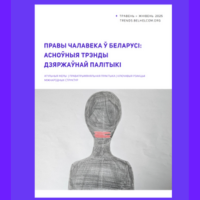
A review of the key trends in public policy on human rights for May–August 2025 has been published.
In brief: control over various aspects of private life and self-expression is tightening.
Among the trends:
Discrimination against the LGBTQ+ community and people who identify as childfree
The introduction of administrative liability is planned for “propaganda of homosexual relations, gender transition, childlessness, and pedophilia.” This article (Art. 19.16 of the Administrative Code) is still just a draft law. However, the likelihood of its adoption is extremely high.
Thus, between 2023 and 2025, the state moved from public narratives to administrative liability.
The discriminatory provisions concern not only the LGBTQ+ community. The state plans to prohibit all people from publicly expressing themselves on important aspects of private life. The ban could cover any forms of identity expression and LGBTQ+ positions, many feminist views, human rights positions concerning equality, protection of privacy, women’s rights and LGBTQ+ rights, as well as informational materials, particularly in the field of sex education and family planning, works of art, and much more.
Participation in international competitions and contests – under state control
Administrative liability is being introduced for violations of the procedure for participation in international competitions, contests, and Olympiads. Fines are envisaged for “unlawful representation.” This is also still only a draft law. However, the likelihood of its adoption is extremely high.
Representation of the country in international competitions is effectively being monopolized by the state. It should be recalled that at present, if only one representative or team may compete on behalf of the country, participation is possible only under state rules and with the permission of the authorized bodies. This procedure was established by presidential decree at the end of 2024.
The introduction of administrative liability will further restrict the space for self-expression and the autonomy of civil society.
State monopoly on school education
A ban has been introduced on distance learning in foreign secondary schools for children residing in Belarus (previously, it was possible to study online at Russian and some Western schools). Given the near-total elimination of private schools in Belarus, this effectively amounts to a state monopoly on secondary education.
Right to privacy
Once again, opportunities for violating the right to privacy have been expanded. In early 2024, legislative amendments in the areas of passenger transportation and banking operations granted law enforcement agencies broad powers to monitor virtually all aspects of an individual’s life, while also extending the Investigative Committee’s authority to access personal data without the person’s consent. Now, another measure has been added: operative-investigative bodies have been given legally enshrined, round-the-clock access to the automated system for recording and storing data on the movement of registered postal items
Access to professions
The list of jobs requiring political loyalty keeps growing. Between May and August 2025, new professions came under tighter state control: real estate agents, auditors, and insolvency administrators. Tour guides and interpreter-guides faced another round of restrictions as well.
Regulation of external labor migration: additional restrictions for employers and violations of migrants’ rights
New legislative amendments in the sphere of external labour migration —presented by the state as measures to improve regulatory efficiency — in practice put both migrant workers and their employers in a more vulnerable and discriminatory position. Presidential Decree No. 202 of May 2025, «On Strengthening the Role of Employers in the Field of External Labour Migration», both assigns employers supervisory functions not inherent to their role, thereby shifting responsibility away from the state, and simultaneously restricts migrant workers’ right to freely choose their employment.
Restrictions on pension provision for people in detention
Further changes have also been introduced to pension provision, which may negatively affect the rights of pensioners in detention. Responsibility for administering their pensions has been transferred from the Social Protection Fund to the Ministry of Internal Affairs system. The entire amount of a labour pension will now be transferred to the correctional institution, which will carry out all deductions before crediting the remaining balance to the individual’s account.
It is also worth recalling another restriction highlighted in the May-August 2024 issue: the grounds for pension deductions have been broadened. Pensioners in detention can now be required to contribute not only towards food and utilities, but also towards personal hygiene products, clothing, and footwear.
Militarization of education: mandatory field training camps for all 10th-grade students
Starting in 2026, mandatory field training will be introduced for all 10th-grade students. Previously, the ten-day training was compulsory only for cadets and Suvorov school students. The new training will run from 26 May to 5 June — immediately after the end of the academic year.
Beyond the ideological harms of militarising general secondary education (which violates the right to education in terms of its aims), this measure raises further concerns about the infringement of other children’s rights, particularly, freedom of conscience.
About the Review of Trends
This review will highlight the substantive changes in Belarusian public policy in the field of human rights and reactions to it of the international community in three areas:
- general measures: systemic things — legislation, strategies, policies, that generally determine the conditions and background for the implementation of human rights in Belarus;
- law enforcement practice: concrete violations of civil and political rights, as well as in the field of social, economic, and cultural rights;
- key decisions and reactions of international institutions regarding the situation with human rights in Belarus.
Our analytics is for a better understanding of the trends and situation with human rights in Belarus and for the possibility of monitoring systemic and essential changes, as well as for expanding the human rights focus in related expert spheres (economic, political, social, etc.). It also can be used for justification of positions, opinions, policies, and strategies.




